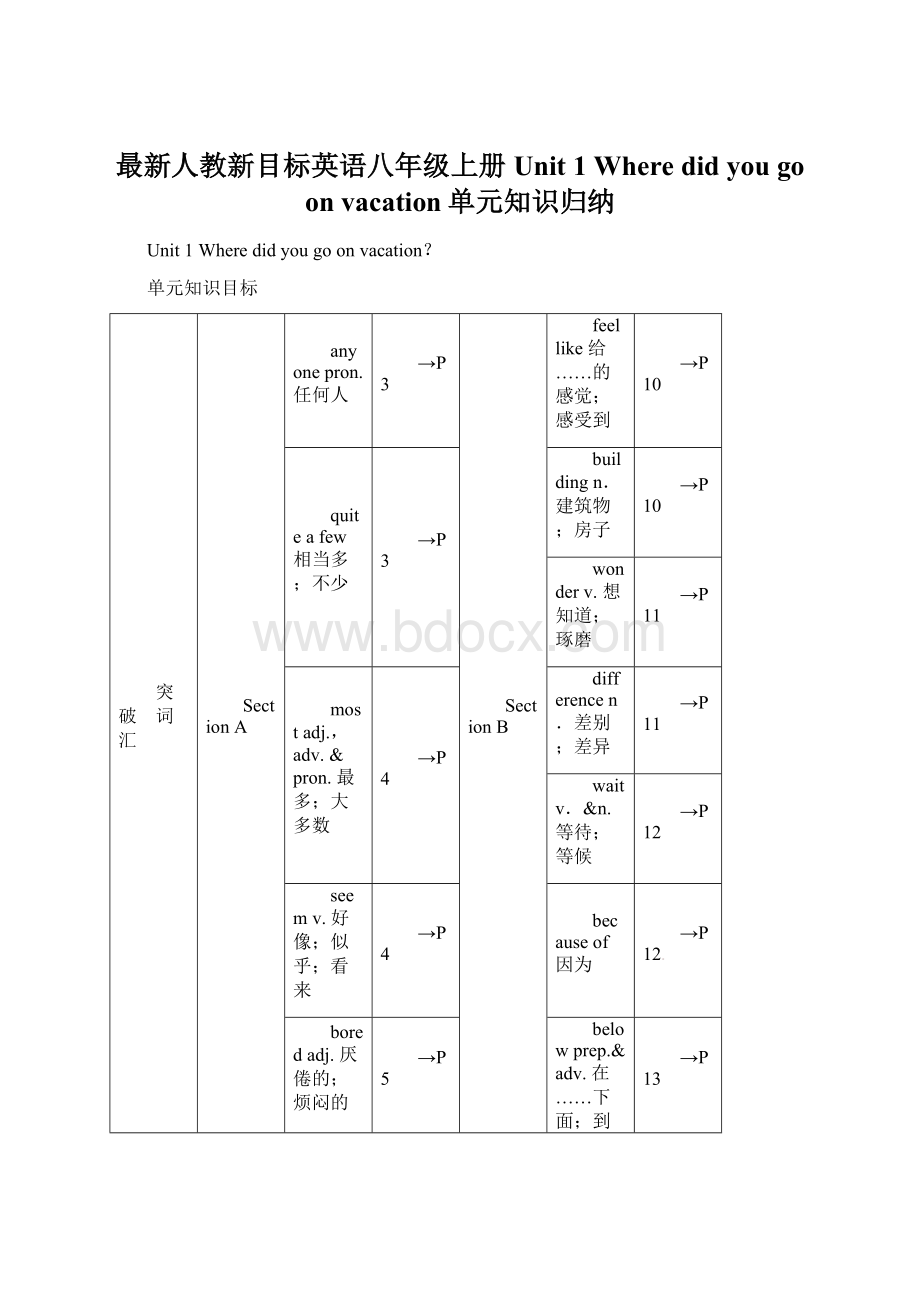最新人教新目标英语八年级上册 Unit 1 Where did you go on vacation单元知识归纳文档格式.docx
《最新人教新目标英语八年级上册 Unit 1 Where did you go on vacation单元知识归纳文档格式.docx》由会员分享,可在线阅读,更多相关《最新人教新目标英语八年级上册 Unit 1 Where did you go on vacation单元知识归纳文档格式.docx(25页珍藏版)》请在冰豆网上搜索。

充分的
decidev.决定;
选定
tryv.&
n.尝试;
设法;
努力
dislikev.&
n.不喜爱;
厌恶
→P14
把
握
句
型
1.IfeltlikeIwasabird.
我感觉像是一只鸟。
feellike后接的是宾语从句。
2.Iwonderwhatlifewaslikehereinthepast.
我很想知道过去这儿的生活是什么样的。
注意wonder的用法。
3.Whatadifferenceadaymakes!
一天的差别有多大!
注意感叹句。
4.Andbecauseofthebadweather,wecouldn'
tseeanythingbelow.
因为这恶劣天气,我们看不到下面的任何景色。
注意becauseof的运用。
熟悉
语法
学习不定代词的用法。
规则动词和不规则动词的过去式。
学会
交际
学会询问度假情况的交际用语。
写作
练笔
记叙假期发生的事情。
课文翻译
SectionA2d
Rick:
Hi,Helen.Longtimenosee.
Helen:
Hi,Rick.Yes,Iwasonvacationlastmonth.
Oh,didyougoanywhereinteresting?
Yes,IwenttoGuizhouwithmyfamily.
Wow!
DidyouseeHuangguoshuWaterfall?
Yes,Idid.Itwaswonderful!
①Wetookquiteafewphotosthere.Whataboutyou?
Didyoudoanythingspeciallastmonth?
Notreally.②Ijuststayedathomemostofthetimetoreadandrelax.,
里克:
你好,海伦。
很长时间没有见面了。
海伦:
你好,里克。
是的,我上个月在度假。
噢,你去了什么有趣的地方吗?
是的,我和我家人去了贵州。
哇!
你看到黄果树瀑布了吗?
是的,看到了。
太壮观了!
我们在那儿拍了许多照片。
你呢?
上个月你做了什么特殊的事情吗?
没有。
大多数时间我只是待在家中读书、休息。
知识详解
1.Didyougowithanyone?
你和别人去的吗?
【解读】 anyonepron.任何人,它是复合不定代词。
可用于肯定句。
Anyonecancomeheretohavetheparty.
任何人都可以来这儿参加宴会。
【拓展】
(1)表示“某人”,常用于否定句、疑问句及条件句。
(2)用作主语,谓语动词用单数;
若需用代词代替,可用单数he,him或复数they,them均可。
(3)被形容词修饰时,形容词应置于其后。
Icandoitifanybodycan.
如果有谁能干这事,我也能。
Ifanyonecomes,askhim(them)towait.
要是有人来,让他(他们)等着。
Didyouseeanyoneinteresting?
你见过有趣的人吗?
【例1】Can______thinkofawaytogetmoney?
A.someone B.anyone
C.someone D.anyone
点拨:
本句是一般疑问句,故排除A、C两项;
anyone后接of短语,故也排除。
句意为“有谁能想出一个得到钱的方法吗?
”
答案:
D
【例2】Ididn'
tmeet______there.
A.someoneimportant B.anyoneimportant
C.importantsomeone D.importantanyone
浏览题干可知是否定句,故用anyone。
形容词修饰anyone时,应放在后面。
故选B项。
B
2.①Wetookquiteafewphotosthere.我们在那儿拍了许多照片。
【解读】 quiteafew相当多;
不少,修饰可数名词复数,表示肯定意义。
Ihavequiteafewfriendshere.
我在这儿有相当多的朋友。
Therearequiteafewbooksontheshelf.
书架上有不少书。
【辨析】
quiteafew,quitealittle,few,little
(1)quiteafew同上。
(2)quitealittle相当多;
不少,修饰不可数名词,表示肯定意义。
There'
squitealittlewaterinthebottle.
瓶子里有很多水。
(3)few几乎没有,表示否定意义,修饰可数名词复数。
Fewpeopleknowhiminthecity.
在这个城市很少有人认识他。
(4)little几乎没有,表示否定意义,修饰不可数名词。
slittletimeleft.几乎没有时间了。
【例1】There'
re______interestingplacesinChina.
A.quiteafew B.quitealittle
C.few D.little
根据places是可数名词复数可知用few短语;
再根据句意“在中国有有趣的地方”表示肯定,故选A项。
句意为“中国有许多有趣的地方”。
A
【例2】Sorry,Icangiveonly______watertoyou.
A.afew B.alittle
C.few D.little
首先water是不可数名词,故用little短语;
根据题干中的only可知表示“有点”,故用alittle。
句意为“很抱歉,我只能给你一点水”。
3.②Ijuststayedathomemostofthetimetoreadandrelax.大多数时间我只是待在家中读书、休息。
【解读】mostadj.,adv.&
pron.最多;
(1)most可以用作代词,意为“大部分;
大多数”。
MostofthestudentsinourclasslikeEnglish.
我们班大多数学生喜欢英语。
(2)most可以用作副词,意为“最大;
最高”。
Thisisthemostdifficultproblemofthethree.
这是三个问题中最难的一个。
(3)most用作形容词,意为“大多数的;
大部分的”。
Mostchildrenlikeplayingfootballverymuch.
大部分的孩子非常喜欢踢足球。
(4)most可以是many和much的最高级,表示最多的。
Hehasthemostfriendsinourclass.
在我们班里,他的朋友最多。
Heownsthemostmoneyamongmyfriends.
在我的朋友中,他的钱最多。
【例1】______don'
tliketheirchildrentoplaycomputergamestoomuch.
A.mostparents B.mostoftheparents
C.Mostparents D.Mostoftheparent
根据开头单词首字母要大写,排除A、B两项;
D项中的parent应用复数形式,故排除。
句意为“大多数家长不喜欢他们的孩子玩电脑游戏太多”。
C
【例2】根据汉语意思完成下列句子
①我最需要她的帮助。
Ineedherhelp______.
②我总是花大部分时间来学习英语。
Ialwaysspend__________________English.
①most ②mosttimelearning
4.Stillnooneseemedtobebored.仍然没人看上去无聊。
【解读】 seemv.好像;
(1)seem+adj./n.似乎是……
Lucyseemsquitehappy.露西似乎很高兴。
Itseemsagoodidea.似乎是一个好主意。
(2)seem+todosth.好像……
Group2seemedtowinthematch.
二组好像赢了比赛。
(3)Itseemsthat...好像……,可以与seemtodosth.互相转换。
Histemperatureseemstobeallright.=Itseemsthathistemperatureisallright.他的体温好像很正常。
【解读】boredadj.厌倦的;
通常用来形容人。
Ifeelboredtoreadthiskindofbook.
我读这种书感到无聊。
boring也是形容词,意为“无聊的;
令人厌烦的”,通常用来形容物。
Thiskindofbookissoboring.
这类书如此无聊。
【例1】Theoldman______tohaveknownthegoodnews.
A.needs B.wants
C.seems D.sounds
A项意为“需要”;
B项意为“想要”;
C项意为“好像”;
D项意为“听起来”。
根据句意“这位老人好像知道了这个好消息。
”可知应该选C项。
【例2】Heseemstobeill.(改为同义句)
Heseems______.
It______thathe______ill.
ill;
seems;
is
【例3】Heisso______toseethe______book.
A.bored;
bored B.boring;
bored
C.bored;
boring D.boring;
boring
第一空是形容人,用bored,第二空修饰物,用boring,故选C项。
不定代词
一、概念
不指明代替任何特定名词或形容词的代词叫不定代词。
二、常见的不定代词
some一些
somebody某人
someone某人
something某事
any一些;
任何
anybody任何人
anyone任何人
anything任何事
no无
nobody无人
noone无人
nothing无物
every每个
everybody每人;
大家;
人人
everyone每人
everything每件事;
一切
all全体;
全部
both两个(都)
none没人或物(指两个以上)
neither没人或物(指两个当中)
either任何一个(指两个当中)
each每个
other(s)另一个(些)
another另外一个;
又一个
much很多
many很多
few几乎没有
afew一些;
几个
little几乎没有
alittle少数几个
【例1】—Whohelpedyourepairyourbike?
—______!
Irepaireditallbymyself.
A.Anybody B.Everybody
C.Somebody D.Nobody
根据答语“我自己修的”可知是“没人”,故D项正确。
句意为“——谁帮你修的自行车?
——没人。
我自己修的”。
【例2】Makesureyou'
vegottheticketsandguidebooksand______beforeyouleave.
A.something B.anything
C.everything D.nothing
句意为“确保你离开前,带好票、指南以及所有的东西”,故C项正确。
【例3】Shehaswrittenalotofbooks,but______aregoodones.
A.any B.some
C.few D.many
根据but可知前后意思表示转折,“她已经写了许多书”,但是“几乎没有好的”,故选C项。
三、不定代词的用法要注意
1.some系列的词项是肯定词,主要用于肯定句;
any系列的词项是非肯定词,主要用于疑问句、否定句或条件状语从句中。
它们都既可修饰可数名词,也可修饰不可数名词。
Thereissomethingwrongwithher.
她生病了。
Thereisn'
tanyoneintheclassroom.
教室里没有人。
Isthereanymeatinthekitchen?
厨房里还有肉吗?
【注意】
在Wouldyoulikesth.?
之类的问句中用some,不用any。
2.由some,any,no,every构成的复合不定代词作主语时,谓语动词用第三人称单数形式。
EveryoneinChinalikestheSpringFestival.
在中国,人人都喜欢春节。
3.形容词修饰不定代词时,通常放在不定代词的后面。
Pleasedosomethingspecial.
请做些特别的事情吧。
4.几组不定代词的区别:
(1)both,either,neither
这三个词都指两者,both表示“两者都”,either表示“两者中的任何一个”,neither表示“两者都不”。
—Whichdoyoulikebetter,teaorcoffee?
你更喜欢哪个,茶还是咖啡?
—Neither,Ilikewaterbetter.
两者都不,我更喜欢水。
(2)afew;
few;
alittle;
little
①afew,few用来修饰可数名词,alittle,little用来修饰不可数名词。
其中afew,alittle表示肯定,意为“有一些”;
few,little表
示否定,意为“几乎没有”。
②quiteafew和quitealittle意为“相当多”;
veryfew和verylittle意为“很少”。
Thereisalittlemilkleftinthebottle.
在瓶子里有点剩余的牛奶。
Thereislittlemilkleftinthebottle.
瓶子里几乎没有牛奶了。
Therearequiteafewapplesinthestore.
在商店里有相当多的苹果。
【例4】—Whatelsedoyouwant?
—______else.IthinkIhavegoteverythingnow.
A.Something B.Everything
C.Nothing D.Anything
根据答语“我认为现在我准备好了一切”可知“没什么其他的”,故选C项。
【例5】—Thebooksaresonice,whichonecanItake?
—Oh,youcantake______ofthem.I'
llkeepnone.
A.both B.all C.neither D.either
根据答语中的none可知表示三者或三者以上,故排除A、C、D三项。
句意为“——这些书这么好,我可以拿哪本?
——哦,你可以都拿走。
我一本也不要”。
【例6】—Doyouhaveanywater?
—Yes,Ihave______inmyglass.
A.little B.few C.afew D.alittle
根据water是不可数名词,故排除修饰可数名
词的B、C两项;
答语是肯定的,故选D项。
【例7】Mysisterhastwoskirts.Oneisyellow,______isblack.
A.other B.another C.others D.theother
根据题干可知“两件裙子中的另一件”用theother表示。
故选D项。
【例8】—Wouldyoulikesomebreadorcookies?
—______,thanks.Idon'
thaveanyfoodbeforegoingtobed.
A.None B.Either
C.Neither D.both
根据问句的“面包和甜饼”可知表示两者,排除A项;
答语“我在上床前不吃任何食物”,故“两者都不要”,选C项。
(3)none,noone
①none表示对三个或三个以上的人或事物的否
定,意为“没有什么人”或“没有什么东西”,用作主语和宾语,后面可以接of短语。
—Howmanybooksarethereonthedesk?
桌子上有多少书?
—None.一本也没有。
②noone意为“无一人,没有人”,仅指人(=nobody),常用来回答who的提问。
—Whoisinyourroom?
谁在你的房间里?
—Noone.没人。
(4)many,much
many修饰可数名词,much修饰不可数名词。
Hehascollectedmanystampsintenyears'
time.
十年间他收集了许多邮票。
ThiscoatcostsmuchmoneyandIcan'
taffordit.
这件大衣太贵了,我买不起。
【例9】—Howmanypeoplearethereinthehall?
—______.Theyallgohome.
A.Noone B.None
C.Nobody D.Everybody
问句是以howmany引导的特殊疑问句,答语通常用none;
此处指“没有一个人”。
【例10】Asmilecostsnothing,butgivesso______.
A.little B.few
C.many D.much
but表示转折,前半句意为“一个微笑不花钱”,故后半句“但是给予那么多”,故选D项。
SectionB&
SelfCheck
SectionB2b
DidJanehaveagoodtimeonMonday?
WhataboutonTuesday?
Monday,July15th
IarrivedinPenanginMalaysiathismorningwithmyfamily.①Itwassunnyandhot,sowedecidedtogotothebeachnearourhotel.②MysisterandItriedparagliding.③IfeltlikeIwasabird.Itwassoexciting!
Forlunch,wehadsomethingveryspecialMalaysianyellownoodles.Theyweredelicious!
Intheafternoon,werodebicyclestoGeorgetown.④Therearealotofnewbuildingsnow,butmanyoftheoldbuildingsarestillthere.InWeldQuay,areallyoldplaceinGeorgetown,wesawthehousesoftheChinesetradersfrom100yearsago.⑤Iwonderwhatlifewaslikehereinthepast.Ireallyenjoyedwalkingaroundthetown.
Tuesday,July16th
⑥Whatadifferenceadaymakes!
MyfatherandIdecidedtogotoPenangHilltoday.Wewantedtowalkuptothetop,butthenitstartedrainingalittlesowedecidedtotakethetrain.⑦Wewaitedoveranhourforthetrainbecausethereweretoomanypeople.Whenwegottothetop,itwasrainingreallyhard.Wedidn'
thaveanumbrellasowewerewetandcold.Itwasterrible!
⑧Andbe